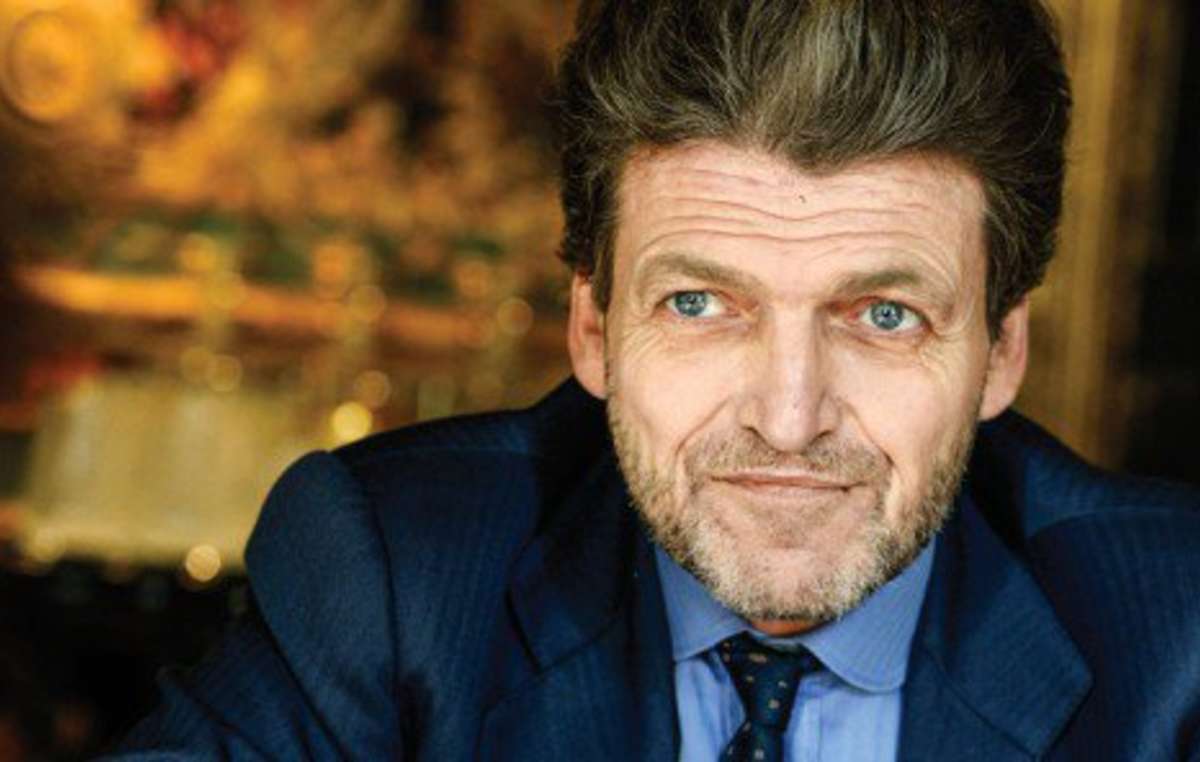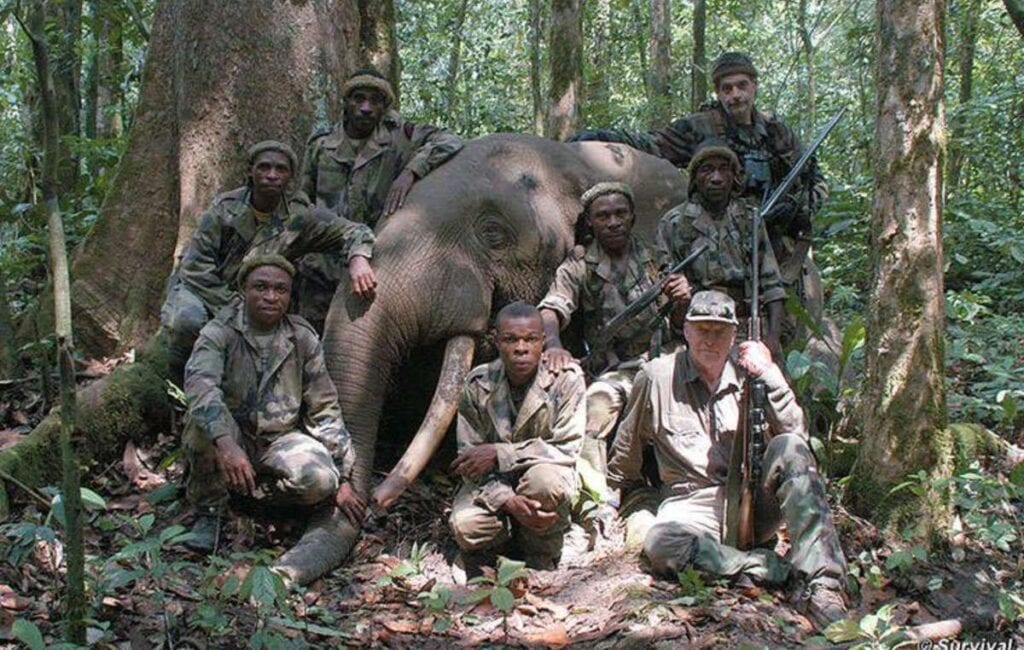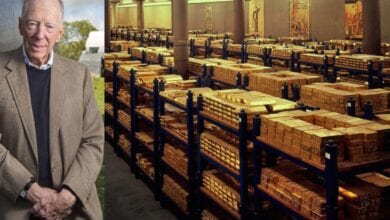Benjamin de Rothschild is Forcing Native Pygmies Off Their Own Land So the Elite Can Slaughter Elephants

As previously reported, the Rothschild family is one of the five most influential families in the world. And according to Survival International, a London-based activist group, they do so quite brutally.
One of French billionaire’s, Benjamin de Rothschild’s holdings, a hunting preserve located in Cameroon, is reportedly quite savage in the way it treats pygmies who live around the now private hunting grounds, even though the pygmies lay historical claim to the leased 1,000,000 acres of disputed lands.
Now, the pygmies have apparently become the target of the hunting preserve’s guards, who’ve reportedly destroyed at least three of their encampments and brutally beaten some of the men.
The UK Times reported, the Faro West Lobeke hunting company, jointly owned by Baron Rothschild and a French professional hunter, Pierre Guerrini, has been charging wealthy clients upwards of 56,000 dollars to hunt, kill, and harvest endangered elephants (even though the practice is condemned under international law).

However, native pygmies inhabit the land. They hunt the very same lands Baron Rothschild now leases, supposedly from the government of Cameroon.
According to the hunting company’s own website, they employ special forces soldiers to deal with the locals, even using ultralight aircraft to do so.
The company’s website states the wealthy clients will be protected by “anti-poaching and Special Forces armed patrols (who) use our ultralights and separate vehicles,” to ensure client safety.
According to recent reports, that wealthy client safety comes at the expense of beating the locals into submission to the wishes of the oligarchs.
The preserve’s conservation efforts have even been endorsed by a conservationist group, the World Wildlife Fund (WWF).
While their website describes their efforts to help the locals farm Tilapia, their motivation for doing so is to provide protein to the locals to prevent them from hunting in the forests, something they have described as poaching, illegal taking of game for resale or sustenance.
But is it poaching if the land has traditionally belonged to the Baka people — and the hunt to live?
The WWF’s website states:
“The Tembe village fishpond is part of a WWF initiative that gives local communities and the indigenous Baka people that live around three national parks in Southeast Cameroon a new source of protein and revenue. The project will produce at least 10 tons of fish per year by creating several new ponds, similar to the one in Tembe.
“WWF hopes the new fishponds also will help quell the poaching crisis that is rampant in most of the Congo Basin to supply the bushmeat trade. Attempts have been made to deal with the issue at the source –anti-poaching patrols around protected areas and logging concessions, for example – and at the consumer level through education and awareness campaigns. But additional strategies are needed.”
The WWF purports to be working alongside Cameroon’s Ministry of Livestock, Fisheries and Animal Husbandry to create the sustainable fishery. But why should the Baka people be forced to eat only fish?
According to the WWF report, their current diet consists of “36 species of animals” taken in and around the Lobeke National Park, one of three parks that surround the WWF’s Tilapia pond initiative.
According to the WWF, they’re “working to put in place longer-term, sustainable and innovative solutions that will reduce the consumption and trade in meat from wild species without compromising the health and livelihoods of forest communities.”
There is no published connection between WWF’s fishery and the recent beatings and torture of the Baka people. In fact, the only reference made to the Baka people group on their website, was made in the 2010 article about the fishery they attempted to establish to prevent the locals from eating forest harvested meat.
Further complicating matters for WWF is the fact that while they’re actively telling the Baka people they cannot hunt on their traditional hunting lands, one of their trustees, Peter Flack — noted big game hunter and conservationist — has been photographed killing elephants in the disputed land on the hunting preserve owned and operated by the Rothschilds.
This elephant slaughter seems particularly hypocritical to outsiders.
Local authorities, along with the safari camp employees, have been turning up the heat on the locals. The Baka pygmies, most recently, are reportedly being forcibly removed from their hunting camps, tortured, and forced to relocate for coming too close to Rothschild’s hunting operation in Cameroon.
Survival International writes:
“The Baka report that three of their forest camps have been burnt by wildlife guards and safari camp employees in the last year alone. Baka men hunting for food in this forest have been beaten by local police, soldiers and wildlife guards.”
“They told me to carry my father on my back. I started walking, [the guard] beat me, he beat my father. For three hours, every time I cried out they would beat me, until I fainted and fell to the ground with my father,” reported SI who say they conducted the interviews with Baka men who survived the forcible removal from their ancestral lands and heavy handedness at the hands of preserve guards.
“When the trophy-hunting company finds us here, they burn the camps. They beat us, they search for us, they set their dogs on you, their guns on you,” reported a second Baka man.
A third pygmy man told SI:
“The trophy-hunting company said that if they see anyone [in the forest] bullets will fly. Now those who have family there have gone to get them out. How will we live now?”
The pygmies use the forest to hunt food and have been doing so for as long as anyone can remember.
The Rothschild family has the advantage, as their wealth and influence can afford to buy as many hired guns as it takes to permanently remove the pygmies from their leased hunting grounds.
So the dispute is likely to continue with the only hunters welcome on preserve land being the paying ones. The real losers are likely to continue to be the pygmies who’ll have to find somewhere else to hunt for meat.
According to Survival International’s director, Stephen Corry, the oligarchical practice of forcibly removing indigenous groups from their homelands for trophy hunting enthusiasts is widespread.
“Across Africa, rich trophy hunters are welcomed into the same areas where tribal hunters are illegally evicted from their ancestral homelands and brutalized for hunting to feed their families. This has to stop.
“Conservation in the Congo Basin is land theft, a continuation of colonialism. It leads to widespread and horrific human rights violations, including extrajudicial killing. Why are so few people speaking out? Survival is leading the fight against these abuses. Conservationists must respect human rights like everyone else is supposed to.”
It really doesn’t matter if the motivation for forcibly removing people from their homeland is for a hunting preserve, under the banner of conservationism or not. The elite seemingly have no problem laying claim to whatever tickles their fancy.
They decide what they want to do, sign a lease with a cooperating government, establish new rules for hunting and poaching, and begin a campaign of education to retrain the people to think a certain way.
They even establish alternative forms of income to keep the herd numbers large, all for the sake of big game hunting and profiteering.
However, the blame is not solely shared by the world’s richest one percent, corporations are just as likely to follow the example of the world’s elitists. The Corporatocracy is something we often refer to as the root of so many problems in the world today.
It is loosely defined as a corporation’s use of leases to take land from those who lay claim to it, who use their influence in government to get laws passed in their favor, and who use police and private security to forcibly remove indigenous people groups, protesters, or dissidents, all in an effort to improve the company’s bottom line.




